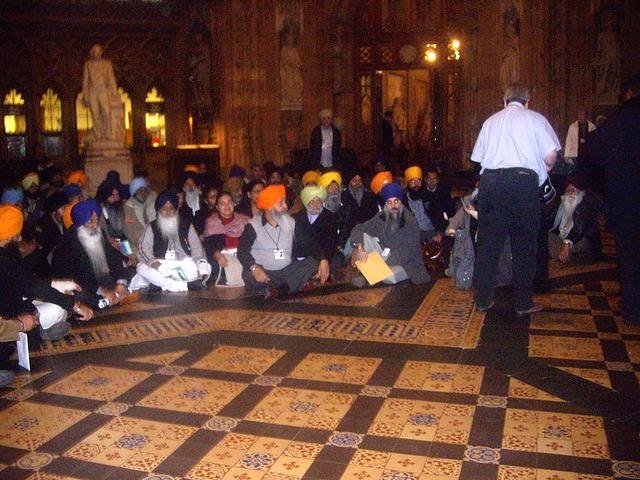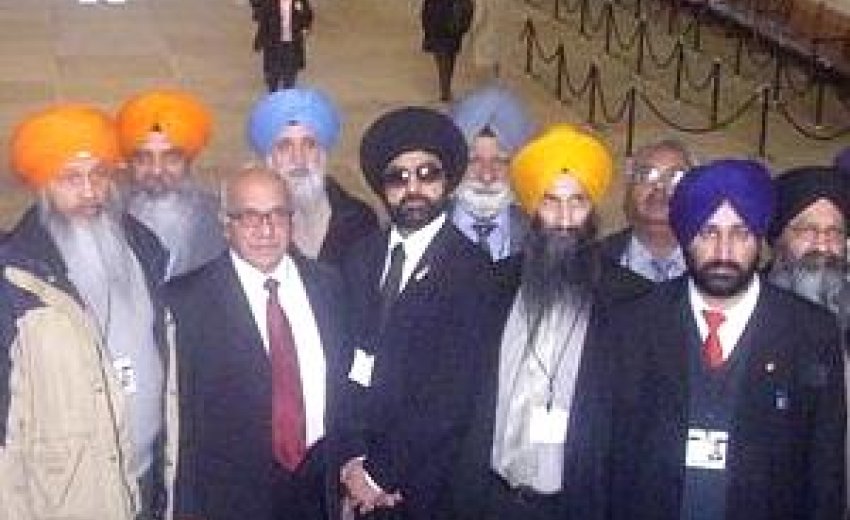At the end of the Sikh Lobby in the UK Parliament on Thursday19 November Sikhs decided to spontaneously show their disappointment with the lack of UK Government action in not addressing its concerns on separate Sikh monitoring, Code of Practice on Sikh articles of faith, discrimination against Sikhs across Europe and excluding those involved in the genocide of Sikhs in November 1984.
The 10-minute sit down protest that came at the end of the lobby involved around 70 Sikhs sitting down in a silent protest in the Central Lobby - the core of the Palace of Westminster. It is a large octagonal hall that connects the Lords and the Commons lobbies as well as other corridors of the House with an intricately tiled floor. The sit down protest by Sikhs was on the large tiled star in the centre of the hall that can be seen in the photo.

Police, security and the Sergeant at Arms who is responsible for security and keeping order within Parliament were called. However, they appreciated this was a short peaceful protest that the organisers ensured did not disrupt Parliamentary business. In fact the silence that descended on the Central Lobby was remarkable and many non-Sikhs, including security personnel commended the Sikhs for their action.
The point that was made was subtle in that Sikhs are law-abiding citizens that are having their needs ignored and this can be contrasted to others who break the law, but are perversely being rewarded for their behaviour. The sit down protest was to signal Sikhs can and will take direct action to secure fair treatment and their rights.
Five issues were raised during the lobby:
i) the campaign for separate ethnic monitoring of Sikhs for the Census 2011 where the Office for National Statistics (ONS) is ignoring the needs of the Sikh community
MPs were requested to copy their Sikh constituents all correspondence with Jil Matheson the new head of the Office for National Statistics (ONS). MPs were informed an Early Day Motion (EDM) would be tabled and that they would be urged to support. If Parliamentary protocol or other reasons prevent them from signing the EDM a letter of support was requested.
ii) the need for a Code of Practice on Sikh articles of faith where the UK Government has been dragging its heels for four and half years and Sikhs are experiencing more and more difficulties – Kara, Kirpan, Turban (Dastaar) etc.
One of the issues covered in the lobby was the need for a Code of Practice on Sikh articles of faith. The UK Government first promised a Code of Practice four and half years ago. In the meantime Sikhs have been experiencing more and more difficulties. Many of the difficulties have related to the Kirpan, but the wearing of the Kara and the Dastaar has also been challenged.
Considerable pressure has been exerted with the issue raised through Parliamentary Questions, during Parliamentary Debates and in letters to relevant Ministers. Two weeks before the lobby the Sikh Federation (UK) wrote to Rob Marris MP, Chair All Party Parliamentary Group for UK Sikhs, regarding the Code of Practice. Rob Marris challenged the Minister to explain the latest position knowing Sikhs would be in Parliament taking up the matter at the lobby and they would want answers.
In a letter received on 20 November (sent on 17 November) the Parliamentary Under Secretary of State, Shahid Malik confirmed that the Equality & Human Rights Commission (EHRC) would be producing guidance on Sikh articles of faith in early 2010 and the Sikh community would have ownership of the development of the guidance.
The EHRC is taking forward work on developing guidance in partnership with the Department for Communities and local Government (DCLG). The Home Office and the Department for Children, Schools and Families (DCSF) are also participating. A meeting was held in Birmingham on 20 November to discuss a draft circulated on 17 November.
The Sikh Federation (UK) has suggested the Code of Practice is agreed with Sikh community representatives as soon as possible and to have an implementation plan for the Code by 31 March 2010.
Parliamentary Questions were raised with all Government Departments and raised in Parliamentary Debate in April 2005. The UK Government promised at that time in Parliament a Code of Practice, but then changed its mind after the General Election. The Government was again reminded in December 2006 in Parliamentary Debate by MPs from all the main political parties of its promise.
Despite considerable political pressure and numerous individual cases of discrimination the UK Government is still in the process of developing a Code of Practice. Following the lobby the relevant Minister confirmed the Equality & Human Rights Commission (EHRC) is taking forward work on developing the Code of Practice in partnership with the Department for Communities and local Government (DCLG). The Home Office and the Department for Children, Schools and Families (DCSF) are also participating. The Code is expected in early 2010.
iii) the increased discrimination being experienced by turban wearing Sikhs at various airports in Europe
MPs were informed a Sikh lobby was planned at the European Parliament for March 2010 and urged to write to the Europe Minister to arrange with UK MEPs to host the lobby and raise awareness on Sikh articles of faith throughout Europe where Sikhs are being discriminated.
iv) the death penalty case of Professor Davinderpal Singh Bhullar
MPs were requested to provide copies of their correspondence with : i) the German Embassy in the UK; ii) the Foreign and Commonwealth Office; iii) the European Parliament President; and iv) the EC Commissioner for External Relations.
v) the need for the UK Government to stop providing visas to those involved in the Genocide of Sikhs in November 1984
Following the successful campaign to have Jagdish Tytler dropped from the delegation to visit the UK a note was provided to MPs supplying details of a number of leading Indian politicians and police officers implicated in the November 1984 anti-Sikh pogroms. MPs were urged to request the UK Government and other EU member states to exclude entry to these individuals.
